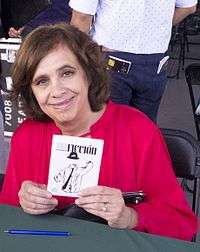Ana María Shua
Ana María Shua (born in Buenos Aires, April 22, 1951) is an Argentine writer who has published over eighty books in numerous genres including: novels, short stories, micro fiction, poetry, drama, children's literature, books of humor and Jewish folklore, anthologies, film scripts, journalistic articles, and essays. Her writing has been translated into many languages, including English, French, German, Italian, Portuguese, Dutch, Swedish, Korean, Japanese, Bulgarian, and Serbian.[1] Her stories appear in anthologies throughout the world. She has received numerous national and international awards, including a Guggenheim Fellowship, and is one of Argentina's premier living writers. She is particularly known in the Spanish-speaking world on both sides of the Atlantic as “the Queen of the Microstory.”[1][2][3][4]
Ana María Shua | |
|---|---|
 Shua in 2016 | |
| Born | April 22, 1951 Buenos Aires, Argentina |
| Occupation | Writer, illustrator |
| Alma mater | University of Buenos Aires |
| Genre | Fiction |
| Notable awards | Guggenheim Fellowship |
| Spouse | Silvio Fabrykant |
| Children | Gabriela Fabrykant Paloma Fabrykant Vera Fabrykant |
Biography
Shua published her first book on poetry, El sol y yo, when she was fifteen years old,[5] in 1967, for which she received the Honor Strip given by the Argentine Society of Writers. She studied at the University of Buenos Aires and obtained a master's degree in arts and literature. During the last military dictatorship in Argentina, often called the National Reorganization Process, she was exiled to France where she worked for the Spanish magazine Cambio 16. Once back in Argentina, she published her first novel, entitled Soy paciente, in 1980, for which she won an award given by Losada publishing house. In 1984, she published La sueñera, a collection of micro fiction. She has worked as a journalist, a publicist, and a screenwriter, adapting some of her writings. She has also written books for children, for which she received some international awards. Shua is Jewish.[6]
Works
| Library resources about Ana María Shua |
| By Ana María Shua |
|---|
Novels
- Soy paciente (I'm Patient, 1980)
- Los amores de Laurita (1984)
- El libro de los recuerdos (The book of memories, 1994)
- La muerte como efecto secundario (Death as a side effect, 1997)
- El peso de la tentación (2007)
- Nemo (2003)
Short story collections
- Los días de pesca (1981)
- Viajando se conoce gente (1988)
- Como una buena madre (2001)
- Historias verdaderas (2004)
Microfiction collections
- La sueñera (1984)
- Casa de geishas (1992)
- Botánica del caos (2000)
- Temporada de fantasmas (Ghost season, 2004)
- Cazadores de Letras (2009)
- Microfictions (2009)
- Quick fix (2008)
- Fenómenos de circo (2011)
Children's books
- La batalla de los elefantes y los cocodrilos (1988)
- La fábrica del terror (1991), Honor List Award by the International Board on Books for Young People
- La puerta para salir del mundo (1992)
- Cuentos judíos con fantasmas y demonios (1994)
- Ani salva a la perra Laika (1996)
- Historia de un cuento (1998)
- Cuentos con magia (1999)
- La luz mala (2000)
- Los monstruos del Riachuelo (2001)
- Planeta miedo (2002)
- Su primera zanahoria (2005)
- Un ciervo muy famoso (2005)
Humorous fiction
- El marido argentino promedio (1991)
- Risas y emociones en la cocina judía (2003)
Poetry collections
- El sol y yo (1967)
Movie adaptations
- Soy paciente (1986)
- Los amores de Laurita (1986)
- ¿Dónde estás amor de mi vida que no te puedo encontrar? (1992)
Documentaries
- En el nombre del padre. Contrakultura, 2002. Biographical sketch of Argentine short-story writer Ana María Shua. Produced by Eduardo Montes-Bradley
References
- "Ana María Shua". Words Without Borders. Retrieved 2015-10-28.
- "Ana María Shua - Imaginaria No. 31 - 9 de agosto de 1999". Imaginaria.com.ar. Retrieved 2015-10-28.
- "The International Literary Quarterly". Interlitq.org. Retrieved 2015-10-28.
- "Ana María Shua". Anamariashua.com.ar. Retrieved 2015-10-28.
- Cook, Alyce (2003). "Review: All Facets of Ana María Shua's Creative World Reviewed Work: El río de los sueños: Interamer. 70. Organización de los Estados Americanos by Rhonda Dahl Buchanan". Confluencia. University of Northern Colorado. 19 (1): 191–193. JSTOR 27922969.
- Silvia G. Dapía, "Polish and Jewish Identities in the Narratives of Ana María Shua", Polish American Studies Vol. 65, No. 2 (Autumn, 2008), University of Illinois Press pp. 53-69.
- "Ana María Shua". Anamariashua.com.ar. Archived from the original on 2015-08-26. Retrieved 2015-10-28.
External links
- Official website (in Spanish)